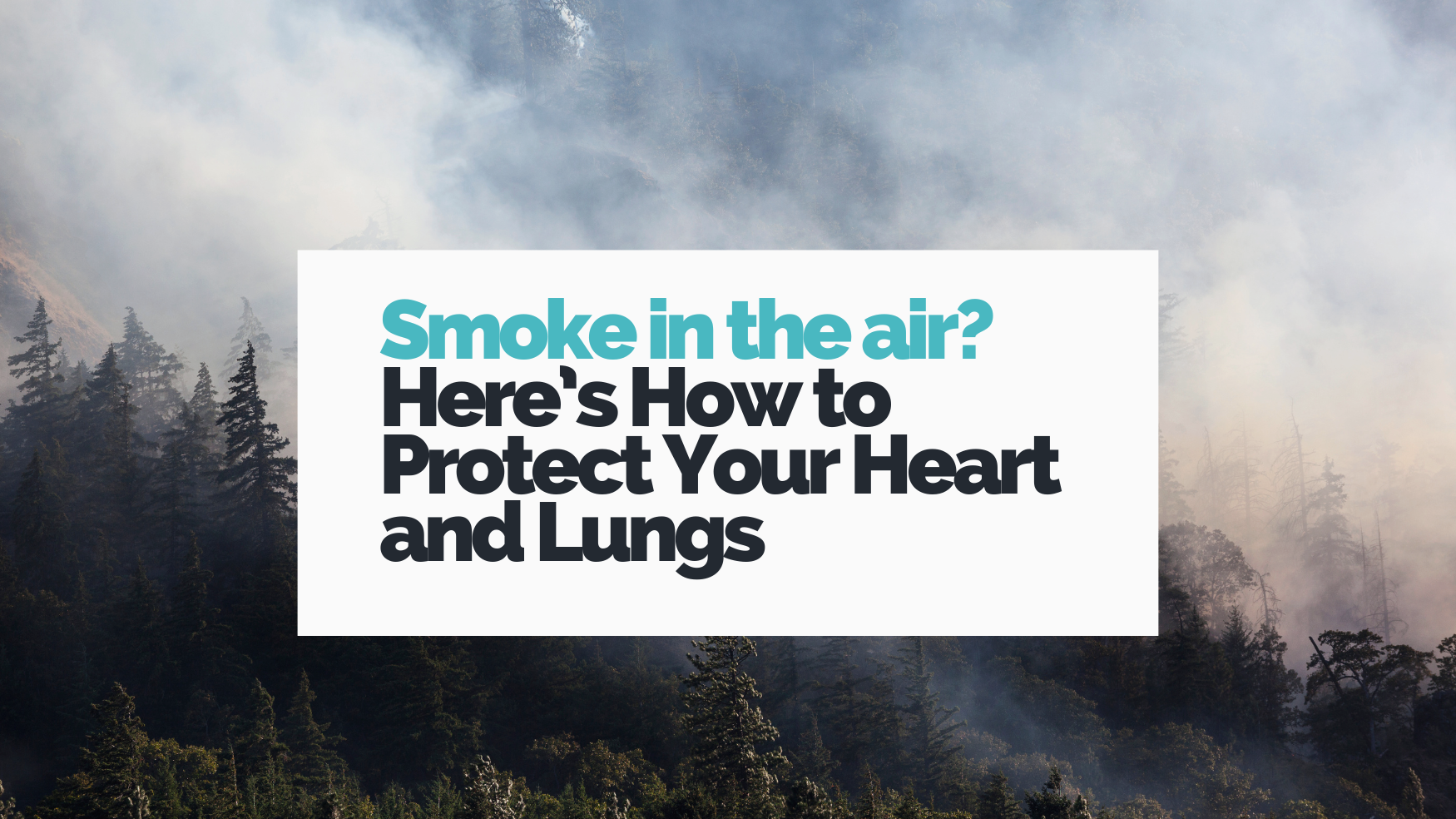
Smoke in the Air? Here’s How to Protect Your Heart and Lungs
- Smoke in the Air? Here’s How to Protect Your Heart and Lungs - September 9, 2024
Oh, beautiful Missoula, you sure do know how to keep things interesting! After largely escaping a summer of smoke we got laid thick here in early September.
It’s important that we all understand the risks to our health and risk mitigation techniques.
In this blog post, we’ll break down the essential information about wildfire smoke, including how it impacts health, practical tips for reducing exposure, and steps you can take to safeguard your family.
The Health Impacts of Wildfire Smoke: What You Need to Know
Wildfire smoke isn’t just a visible reminder of a fire’s destruction—it carries serious health implications that can affect everyone, especially vulnerable groups such as children, the elderly, and those with pre-existing health conditions such as asthma and other respiratory conditions.
Respiratory Irritation and Conditions
One of the primary health concerns associated with wildfire smoke is its effect on the respiratory system. Smoke contains fine particulate matter (PM2.5) that can penetrate deep into the lungs and even enter the bloodstream. For most people, this can lead to immediate symptoms such as coughing, throat irritation, shortness of breath, irritability, headaches, and more.
Children are particularly susceptible because their respiratory systems are still developing, and they tend to spend more time outdoors. Those with asthma or other chronic respiratory conditions may experience exacerbated symptoms, including more frequent and severe asthma attacks. Even people without pre-existing conditions can suffer from aggravated respiratory symptoms due to prolonged exposure.
Cardiovascular Effects
Wildfire smoke doesn’t only affect the lungs—it can also impact the heart. Fine particulate matter from smoke can increase inflammation and oxidative stress in the cardiovascular system, potentially exacerbating conditions such as high blood pressure and heart disease. For individuals with pre-existing cardiovascular conditions, the risks are particularly pronounced, as smoke exposure can lead to more severe complications.
Long-Term Health Risks
The long-term health effects of repeated exposure to wildfire smoke are still being studied, but evidence suggests that chronic exposure can have significant health consequences. Prolonged inhalation of fine particulate matter has been linked to increased risks of chronic respiratory diseases, cardiovascular problems, and even reduced lung function over time. For us Missoulians who are going to be exposed to wildfire smoke for years to come, it’s important to understand the health risks and implement harm reduction techniques.
Protecting Your Family from Wildfire Smoke
Protecting your family from the harmful effects of wildfire smoke involves both minimizing exposure and managing symptoms. During periods of heavy smoke, it’s advisable to stay indoors with windows and doors closed, use air purifiers if possible, and limit outdoor activities. If smoke levels are particularly high or you notice worsening symptoms, consider using N95 masks designed to filter out fine particulates and seek medical advice if necessary.
- Stay Indoors and Create a Clean Air Environment
Minimize Outdoor Activities: On days when smoke levels are high, keep everyone indoors as much as possible. Limit outdoor play and activities to reduce inhalation of smoke particles.
Use Air Purifiers: Invest in air purifiers equipped with HEPA filters to help remove fine particulate matter from indoor air. Place purifiers in frequently used rooms, such as bedrooms and living areas, to improve air quality inside your home. We’ve listed some brands of air purifiers below that we recommend to our patients at Montana Whole Health.
Seal Your Home: Ensure that all windows and doors are tightly closed to prevent outdoor air from entering. Check for and seal any gaps or leaks that might allow smoke to seep in.
- Maintain Good Indoor Air Quality
Avoid Using Combustion Appliances: During smoky periods, avoid using fireplaces, stoves, and other combustion appliances that can further pollute indoor air. Opt for electric or non-combustion heating methods.
Ventilate Wisely: When outdoor air quality improves, briefly open windows to allow fresh air to circulate and remove any trapped pollutants. However, be mindful of air quality forecasts and avoid ventilating when smoke levels are still high.
- Protect Yourself and Your Family when you do go outside
Use N95 Masks: For individuals who need to go outside, consider using N95 masks that are designed to filter out fine particulate matter. Ensure that the mask fits properly to provide effective protection.
Keep Track of Air Quality: Stay informed about local air quality conditions through reliable sources such as air quality monitoring websites or apps. This will help you make informed decisions about when it’s safe to be outside and when to take precautions. At Montana Whole Health, we love checking in with Missoula County Air Tracker:
- Manage Health Symptoms
Concerning symptoms to keep an eye out for:
Please follow up with a provider at Montana Whole Health should you or your child experience any concerning or worsening symptoms which could be related to wildfire smoke exposure, such as the following listed below:
- Shortness of breath
- Chronic cough or worsening cough
- Chronic congestion
- Headaches
- Fatigue
Stay Hydrated: Drinking plenty of water helps keep respiratory tissues hydrated and can assist in alleviating some of the irritation caused by smoke exposure.
Clean Up After Exposure: After returning indoors from a smoky environment, change clothes and wash your hands and face to remove any particles that may have settled on your skin and clothing.
Supplement with Antioxidants: Increasing your antioxidant intake throughout the wildfire smoke season can help counteract some of the detrimental effects of smoke exposure. Increasing antioxidants can help reduce the inflammation in your body that smoke exposure can cause. As a reminder, antioxidants alone will never be enough – avoiding the smoke is the best way to keep yourself healthy.
- Quercetin: Quercetin is a flavonoid that is found in fruits and vegetables, and is particularly high in citrus fruits. You can also find quercetin isolated in supplement form.**
- Vitamin C: Vitamin C is another strong antioxidant that can help reduce the oxidative stress of wildfire smoke and other pollutants. Fruits and vegetables are rich in vitamin C, but you can also add additional vitamin C in supplement form.**
- Antioxidant-rich fruits and vegetables: Be sure to make it to the farmer’s market, and take advantage of local fruits and vegetables (but don’t forget to watch the air quality forecast!).
**It’s important to reach out to your provider at Montana Whole Health for more information about dosing to help mitigate the effects of the oxidative stress caused by wildfire smoke.
Choosing a HEPA Air Filter for your home:
- EnviroKlenz
- EnviroKlenz Air System: This model combines a HEPA filter and a patented cartridge of earth minerals designed to capture and eradicate airborne toxins and particulates. If you call EnviroKlenz and mention Montana Whole Health they will give you 20% off!
- Dyson
- Dyson Pure Cool Link TP02: This model combines a HEPA filter with a fan to circulate clean air. It’s designed to capture 99.97% of allergens and pollutants as small as 0.3 microns.
- Dyson Pure Hot+Cool HP04: A versatile option that includes both heating and cooling functions, along with a HEPA filter to remove airborne particles.
- Honeywell
- Honeywell HPA300: Known for its strong performance, this model features a HEPA filter that captures up to 99.97% of airborne particles, including smoke, pollen, and dust.
- Honeywell HPA200: A more compact version of the HPA300, suitable for smaller rooms but still effective against smoke and other pollutants.
- Levoit
- Levoit LV-H132: A compact and budget-friendly option with a 3-stage filtration system, including a HEPA filter that captures fine particles and smoke.
- Levoit Core 300: Offers a powerful HEPA filtration system, ideal for medium to large rooms, and has a compact design.
- Blueair
- Blueair Blue Pure 211+: This model features a combination of HEPA and activated carbon filters to remove smoke particles and odors. It is effective for large rooms.
- Blueair Classic 480i: Equipped with a HEPA filter and smart capabilities, it provides real-time air quality monitoring and effective smoke removal.
- Austin Air
- Austin Air HealthMate Plus: Known for its robust filtration system, this model includes a HEPA filter and an activated carbon filter, designed specifically to handle smoke, chemicals, and other pollutants.
- Austin Air Bedroom Machine: Designed for use in bedrooms, it offers excellent filtration for smoke and other particles, ensuring cleaner air while you sleep.
- Molekule
- Molekule Air Pro: Utilizes PECO (Photo Electrochemical Oxidation) technology to destroy pollutants at a molecular level, including smoke particles. It’s suitable for larger spaces and offers advanced filtration.
I hope everyone stays safe and healthy while we wait for the weather to change!








Karen Kreisel
September 9, 2024 at 2:07 pmA very simple way to filter air indoors is to plug in a box fan and put a large square hepa filter on the fan. The suction of the fan will keep the filter there with the air going the correct direction. Stay safe.
Dr. Erika Krumbeck
September 10, 2024 at 8:56 amYes, this is a cheap and easy way to make a DIY HEPA filter. Thanks!
Nick Van Dam
September 9, 2024 at 9:06 pmThank you, air pollution has been an issue in Missoula even when I was a child. I noticed the info on supplementing with antioxidants is cut off at the end, “( should not be used as a _______ .
Dr. Erika Krumbeck
September 10, 2024 at 8:56 amThanks Nick, I corrected it!